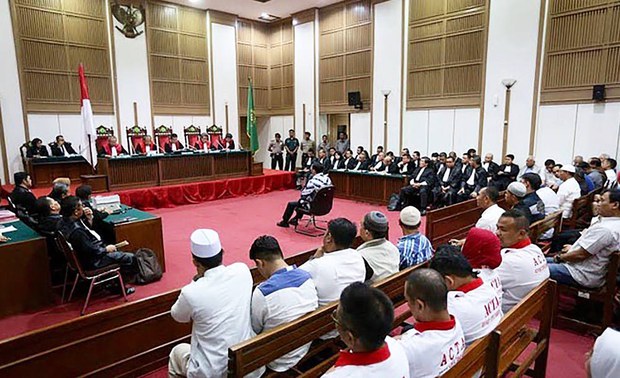Court Convicts, Sentences Jakarta Governor to 2 Years on Blasphemy Charge
2017.05.09
Jakarta
 Basuki ‘Ahok’ Tjahaja Purnama (center) listens as judges read a ruling in his blasphemy case in South Jakarta, May 9, 2017.
Basuki ‘Ahok’ Tjahaja Purnama (center) listens as judges read a ruling in his blasphemy case in South Jakarta, May 9, 2017.
Updated at 4:56 p.m. ET on 2017-05-09
A court on Tuesday convicted and sentenced Jakarta’s Christian governor to two years in prison for blasphemy against Islam, even after the prosecution had dropped the charge, in a case that exposed the rising power of fundamentalism in Muslim-majority Indonesia.
North Jakarta District Court judges ordered Ahok sent to prison immediately, and Indonesia’s interior minister announced he was dismissing the governor at once and replacing him with Dep. Gov. Djarot Saiful Hidayat.
Hundreds of Ahok supporters protested late Tuesday outside the prison in Cipinang, in East Jakarta, where Ahok was initially sent. Outside the court venue, Ahok’s detractors declared the verdict too lenient.
“I want everyone to respect the legal process and the verdict handed down by the panel of judges,” President Joko “Jokowi” Widodo said in a statement to reporters in Papua province.
“We must also respect the steps that will be taken by Basuki Tjahaja Purnama to appeal,” he added. “The government cannot intervene in the judicial process.”
The ruling far exceeded the sentence recommended by the lead prosecutor, who had dropped the blasphemy charge during closing arguments on April 20, saying he could not prove that Ahok had intentionally insulted Islam. Public furor over the comments erupted after a videographer uploaded edited footage of the remarks on social media, he said.
Ali Mukartono recommended two years’ probation followed by one year in jail if Ahok committed a new offense.
The regional bureau of the U.N. Office of the High Commissioner for Human Rights reacted with alarm over the verdict. “We are concerned by jail sentence for #Jakarta governor for alleged blasphemy against #Islam. We call on #Indonesia to review blasphemy law,” it said in a tweet.
‘Acceptable’
In its 630-page decision, the five-judge panel said Ahok committed criminal blasphemy when he told an audience in September they should not be deceived by people citing a Quranic verse that some interpret to mean Muslims should not have a non-Muslim leader.
“In that statement, the defendant considers Al Maidah a tool to deceive people or society. So this court believes the defendant had disparaged and insulted Al Maidah 51,” the ruling said.
The judges went on to say that urging a person to cast their vote based on religion was acceptable in a democracy and no different than choosing a candidate based on ideology or political party.
The judges also ruled that the case had nothing to do with politics and Ahok’s efforts to hold onto his seat in the fiercely fought gubernatorial election, which the Jakarta Post in an editorial called "the dirtiest, most polarizing and most divisive the nation has ever seen."
Ahok won a first round vote in February but lost a run-off on April 19. First elected deputy governor of Jakarta in 2012 as Jokowi's running mate, Ahok ascended to the top job two years later after his boss became president. That made Ahok the highest-ranking ethnic Chinese, Christian politician in Indonesian history.
“The defendant Basuki Tjahaja Purnama has been legally and convincingly proven guilty of committing a criminal act of blasphemy. We give punishment of two years in prison and order the accused to be arrested,” Judge Dwiarso Budi Santiarto said, delivering the verdict.
The judge asked Ahok how he would respond.
“We will appeal,” the governor replied after conferring for a few minutes with his lawyers.

Jakarta Gov. Basuki “Ahok” Tjahaja Purnama (center) speaks to his lawyers after judges sentenced him to two years in prison for blasphemy, May 9, 2017. [AFP]
‘Trial by mob’
The verdict came after a six-month trial and a series of massive street demonstrations calling for Ahok to be ousted for alleged blasphemy.
The man who defeated Ahok at the polls last month, former Education Minister Anis Rasyid Baswedan, rode a wave of anti-Ahok fervor whipped up by conservative Muslim groups that had staged street protests calling for Ahok’s removal from office over the comments.
When he went on trial in December, Ahok apologized for those remarks, saying he had never intended to offend Muslims, and noting that he had been raised by adoptive Muslim parents.
Ahok’s attorneys said the judges had submitted to public pressure in their deliberations.
“There were so many demonstrations,” I Wayan Sudirta said after the court session. He said he doubted the case would have been pursued if Ahok were not running for office.
Ahok supporters outside the courthouse broke into tears after hearing the verdict.
“Hopefully, Ahok is patient and strong,” a 42-year-old woman, Marlina, who was among those weeping, told BenarNews.
Anti-Ahok demonstrators were among hundreds of people who rallied outside the Agriculture Ministry, where the trial was held, as the hearing unfolded.
“He should be sentenced to the maximum of five years,” one of the protestors, Masludin, told BenarNews.
Hendardi, head of the Setara Institute for Democracy and Peace, a Jakarta think tank, said Ahok had been given a “trial by mob,” in remarks cited by Kompas, a national newspaper.
“Judges are indeed independent but they must base verdicts on facts and evidence. The weak evidence presented by prosecutors should have been able to convince the judges to hand down a lighter sentence than that demanded by prosecutors,” Hendardi separately told the Jakarta Post.
“The verdict has proved the blasphemy article is prone to misuse by certain parties,” he added.







